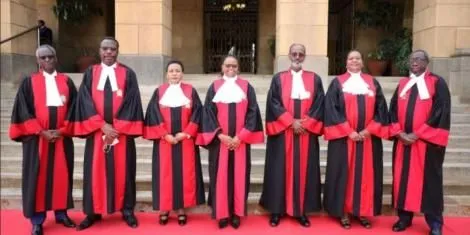The Supreme Court of Kenya has ruled in favor of allowing the government to continue collecting taxes under the Finance Act 2023, underscoring the critical importance of maintaining public interest and fiscal stability.
The court emphasized that suspending tax collection could disrupt ongoing budgeting and appropriation processes, potentially destabilizing the country’s economic framework.
Justices Martha Koome, Philomena Mwilu, Smokin Wanjala, Njoki Ndung’u, Isaac Lenaola, William Ouko, and Mohammed Ibrahim noted the urgency of the situation, directing that the consolidated appeal against the Finance Act 2023 be scheduled for hearing as soon as possible.
The Finance Act 2023 has been under intense scrutiny, with petitioners challenging its constitutionality, arguing that it was passed without adequate public participation.
In November 2023, the High Court declared several provisions of the Act unconstitutional, a decision that led to a series of appeals.
On July 31, 2024, the Court of Appeal went further, declaring the entire Finance Act 2023 unconstitutional.
In response, the government, represented by the Treasury Cabinet Secretary, the Attorney General, the National Assembly, and the Kenya Revenue Authority, filed appeals at the Supreme Court, seeking to overturn this ruling.
The government requested a stay of the Court of Appeal’s decision, arguing that relying on the previous Finance Act of 2022 for revenue collection would create a fiscal shortfall of Ksh240 billion.
The appellants contended that this shortfall would pose a severe threat to Kenya’s monetary and fiscal policies.
Moreover, the State warned that nullifying the Finance Act 2023 could lead to a constitutional crisis, impairing the government’s ability to collect and allocate funds lawfully.
Such a disruption, they argued, could result in interruptions or even a complete halt of essential public services, effectively paralyzing the government.
The government also highlighted the potential economic fallout, suggesting that it might need to resort to borrowing to cover the fiscal deficit, which could exacerbate public debt and inflation. Additionally, the annulment of the Act could expose the government to numerous legal challenges from stakeholders affected by the disruption in financial operations.
In their defence, the respondents, which included over 50 parties, argued that continuing to collect taxes under the Finance Act 2023 would not serve the public interest.
They pointed out that if the consolidated appeal were to fail, Kenyans would be subjected to unconstitutional taxes for an extended period without any recourse for recovering those funds.
The respondents also noted that the government had already invested in the new tax collection system, eTims, and annulling the Finance Act would force a costly and inconvenient return to the old system.
They argued that Article 208 of the Constitution, which establishes the Contingency Fund, provided the government with the necessary resources to meet its fiscal obligations without relying on the disputed law.
In its ruling, the Supreme Court acknowledged the complexities surrounding the case, noting the potential difficulties that could arise from declaring the entire Finance Act 2023 unconstitutional. The court expressed concern that such a declaration could have irreversible consequences, rendering the appeal process futile.
As a result of this decision, Kenyans will continue to pay taxes under the contested Finance Act 2023, including the 16 percent value-added tax on fuel.
The consolidated appeal is set for a virtual hearing on September 10 and 11, 2024, with the court ensuring that all parties comply with previous directives on filings.
















